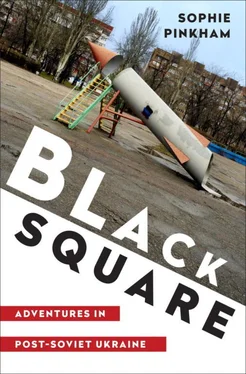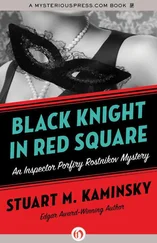Then there was a party at the orphanage for the abandoned children of HIV-positive mothers. There were a lot of these children, in part because HIV-positive mothers were told that they were about to die and unfit to be parents, terrorized into giving up their children to orphanages. (Many were also urged to have abortions.) The orphanage was in the same complex as the AIDS Center, across the river, in the outskirts of the city. It looked like an abandoned factory, though the walls were freshly painted with cartoon characters, and there were clowns and a piano player and puppets playing the turnip game, again. Someone was pulling out all the stops, Irkutsk style, and I wondered if the party was for the children or for us. They’d led us rather quickly through the corridors of the orphanage, which looked, with the exception of the party room, to be gray and underfurnished. Still, the children seemed to be developing normally—not like the abandoned babies, stunted forever by lack of stimulation, that I’d read about in human rights reports. Even Potemkin couldn’t fake cognitive development. Dressed in party outfits, the children crowed at the sight of us, holding out their arms to be lifted up, clutching our legs and asking, “Mama?”
We strolled along the paths around the orphanage with the children, escorted by the old doctor from the AIDS Center. He was wearing a big fur hat and a white coat: Dr. Santa Claus. We held the children’s hands and lifted them up in the air. In the current system, they would never be allowed to go to school and would probably never be adopted. But the orphanage was only for children under five, and Irkutsk had no facility for older HIV-positive children. There was no plan for the children’s future.
At the AIDS Center the next day, Dr. Santa told us that as far as Irkutsk’s AIDS patients were concerned, everything was absolutely fine. He showed us his office and a waiting room, neither of which contained any people. When pressed, he admitted that it might be bad when Irkutsk had thousands of patients with full-blown AIDS and no medication. (Russia, refusing to admit that it had a problem, still hadn’t taken measures to procure anywhere near enough HIV medication for all the people who would soon need it.) But Tanya and Vika started shifting in their seats, and difficult questions dissolved in translation.
• • •
POOR, HIV-POSITIVE EX-DRUG users themselves, the Red Cross outreach workers were unconcerned with diplomacy. We rattled through town in the needle exchange van, with its macrocephalous, syringe-wielding infants, into a neighborhood called “the third village,” the drug dealing spot. We parked in a courtyard. Some of the windows in the surrounding buildings were smashed in, while others still wore lace curtains. There was snow on the ground, and there were plenty of birch trees; the whiteness made the scene look almost innocent.
People started coming over right away. Intent-looking men in anoraks smoked cigarettes as they dropped used needles into the plastic bag hanging on the fender of the van, took new ones, and answered questionnaires. Two tiny old ladies in fur-collared coats and knit hats exchanged syringes for their drug-addicted sons or daughters. We met a drug dealer: a gnarl-faced, sweat-suit-clad, gloveless old woman, an underworld babushka.
The outreach workers provided information about the meager social services available to drug users: rehab programs cost four hundred dollars a month, a vast sum for the average Russian, and probably didn’t do much good anyway. In a government clinic, rehab meant two weeks of heavy sedation. If your family decided to pursue alternative methods, you might be kidnapped, tied to a tree, and flogged.
I’d been afraid that the presence of four staring American girls would scare people away, that no one would want to talk to us. I’d underestimated the trust inspired by the outreach workers, the warm apathy of a heroin high, and people’s limitless desire to talk about their own problems. We struck up a conversation with a girl named Katya, who was nineteen. She had glassy blue eyes, sores on her mouth, and a filthy cloth bandage on her swollen fingers, but she also had round pink cheeks and a little turned-up nose. She was cute, in spite of everything, and even younger than we were. When we ran out of questions, she pressed us for more, laughing and saying, “Come on! Ask me something else!” She had started taking heroin when she was fourteen, after her boyfriend died. She had been hospitalized thirty times, had a baby who was one year old, lived with her parents, and came to the third village morning and night. She had tried to enroll in school but wasn’t allowed to because she was on drugs. She told us all this with a vague, sleepy smile, her gaze drifting away.
Later that week, at the HIV support group run by the Red Cross, we sat in a circle and talked, through the language barrier, about living with HIV in America—not that any of us knew personally. I tried to smile supportively—this was a support group, after all. I had never been in a room full of people with HIV before. Their Russianness was so obvious; their HIV, of course, was invisible. In addition to being the only people in the room without HIV, my roommates and I were the only ones who didn’t have fur coats. “You’ll freeze to death,” one of the ladies in the group told us helpfully.
I WENT TO ELEMENTARY SCHOOL in the heyday of AIDS education, and I was raised to believe that anyone could get HIV at any time. All it took was one moment of bad judgment. But as far as I could tell, people in Irkutsk didn’t get HIV by accident; it was more a by-product of long-term self-obliteration. The inhabitants of Irkutsk didn’t seem to be particularly interested in staying alive. They smoked incessantly, and drunks stumbled around as early as nine a.m. After four p.m., half the guys on the street were wielding huge beers, and fat old men teetered down the sidewalk arm in arm. Junkies roamed the streets at all hours, and our new Russian friends relaxed only when we drank and smoked with them. At the Internet café where I checked my email, people smoked cigarettes and drank from plastic bottles of beer as they typed. Soldiers with automatic weapons strapped to their backs drank liter after liter of beer as they played video games, the kind where you shoot people. I didn’t like sitting next to them.
One day my Czech-speaking roommate came home and told us that while walking down the street, she’d tripped over a guy who had overdosed. His friends were so high that they couldn’t dial the ambulance number on their phones, and they asked her to do it. That night we were awoken by screams and crashes above us; our neighbor was beating his wife. When we went out in the morning, there was a used syringe lying in the vestibule. It was so cold that the inside of the metal front door was covered in frost, and the lock was frozen. We tried to warm the lock with our breath, and we hammered on the icy door. You couldn’t blame the people of Irkutsk for wanting to get high.
Like Vadim the MSM, the staff at the Irkutsk Red Cross had learned the jargon of the international AIDS movement without fully understanding it, in the way that language learners use new vocabulary words in the wrong context, or with a valence that’s slightly off. Vika and company found out that I knew how to sew, and they suggested that I pass the time allotted me by making an “AIDS kvilt.” They were unswayed when I explained that an AIDS quilt should be made by people with HIV or their loved ones. (The original had covered a whole field in Washington, DC, the work of thousands of bereaved family members and friends.) Speaking in a tone that suggested that I was the stupidest person in the world, they explained that no one in Irkutsk would ever publicly admit that they had AIDS.
Читать дальше












